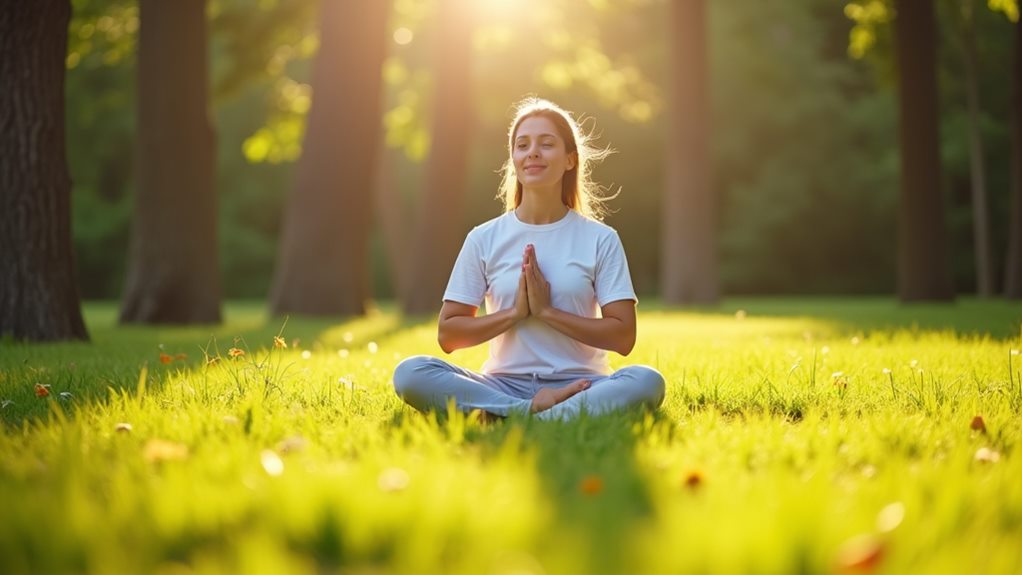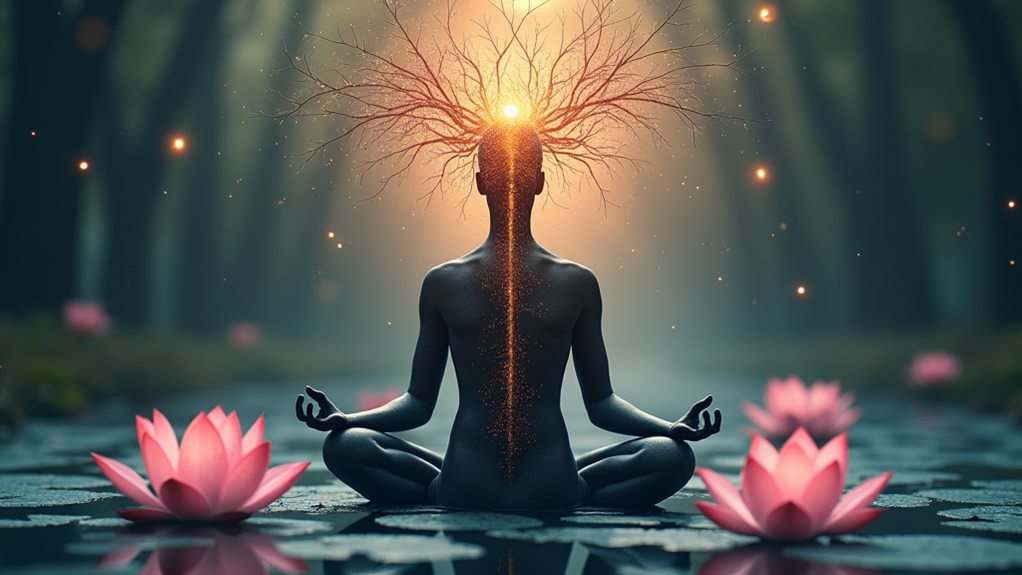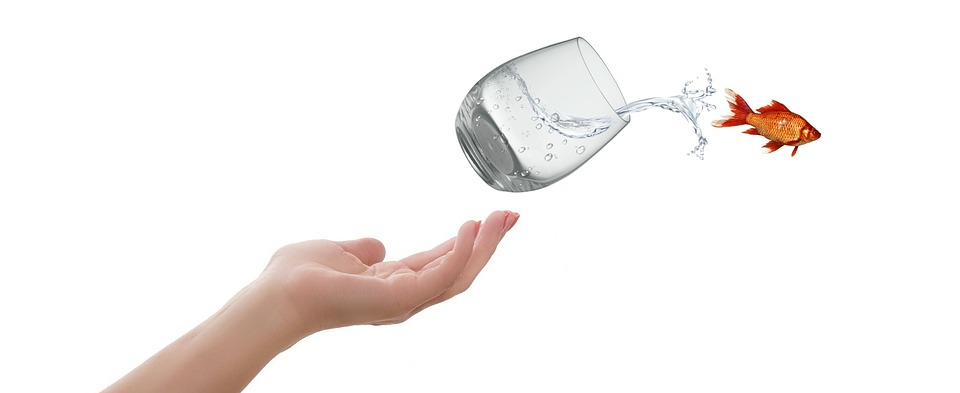
So, mindfulness meditation is your secret weapon against the mental chaos we all love so much. Imagine just sitting there, focusing on your breathing instead of panicking about math tests and whatnot. It’s a no-drama zone where your brain gets a chill pill.
This practice not only makes you less anxious and sad, but it also helps you sleep like a baby. It’s like a mind gym session, improving your emotional control and self-awareness without the need for fancy props or chanting.
Just 10 minutes a day can transform your mental health and the way you tackle life’s craziness. Curious yet?
Understanding Mindfulness Meditation
Mindfulness meditation is all about focusing your attention on present experiences, like your breath and bodily sensations, to foster a sense of calm and emotional balance.
It’s a practice that feels like giving your brain a little relaxation spa day. You’re tuning into your mind, your thoughts, and guess what? You’re allowed to just notice them without freaking out. You don’t have to fix them or react. Imagine that!
Starting a mindfulness practice might seem like adding one more thing to your busy to-do list.
But imagine if this simple practice could actually help you better serve others by improving your own mental health. It’s like putting on your own oxygen mask first. Paying attention to your breathing and sensations might seem trivial, but it’s the basics that often have the most powerful impact.
You don’t have to venture to a mountaintop; just find a quiet corner where you won’t be interrupted.
Join a class or grab an app to guide you. Like a superhero sharpening their mind, you can practice a little every day, just focusing mindfully.
This mindfulness isn’t just fluff; it’s you, leveling up your brain, one breath at a time.
Mental Health Benefits
Imagine your mind as a computer overwhelmed with too many tabs open, each representing stress, anxiety, or depression. It’s chaos, right? Here’s where mindfulness meditation steps in, offering a lifeline. Engaging in regular mindfulness practice can greatly reduce those mental health burdens.
Studies show mindfulness-based stress reduction (MBSR) considerably improves anxiety and depression. Picture it as your computer getting a much-needed reboot. Incorporating mindfulness practices into daily routines fosters sustained mental health benefits.
You see, mindfulness isn’t just about feeling zen; it’s about emotional regulation too. By becoming more self-aware, you feel more empathy for others. And who doesn’t need more empathy? Your mental health flourishes when you understand your emotions better.
Plus, get this—mindfulness can actually change your brain. It increases gray matter, enhancing memory and self-perception. It’s like upgrading your brain’s software without the tech support wait times.
And let’s not forget the power of sleep. Mindfulness has been linked to better sleep quality, reducing those pesky sleep disturbances. A meta-analysis of over 200 studies even found it effective at tackling anxiety, depression, and stress head-on.
Mindfulness Exercise Techniques

Let’s face it, life can be a chaotic mess, but mindfulness exercises are here to save the day!
Whether you’re stressing over math homework or just need to clear your mind, techniques like deep breathing and mindful walking work wonders for enhancing mental clarity.
It’s like giving your brain a spa day—minus the mud masks—so don’t brush off these simple practices that actually help you chill out and focus.
Enhance Mental Clarity
Enhancing mental clarity through mindfulness exercises begins with embracing simple yet effective techniques like focused breathing and body scans.
These mindfulness practices help sharpen attention to the present, allowing you to clear out all that mental clutter. You know, like sweeping out the cobwebs from an attic—only this attic is your mind. Don’t worry, it’s easier than it sounds.
Let’s start with focused breathing. Sitting quietly, breathe in deeply, and then exhale slowly. Repeat. Feel that calming wave wash over you as your mind stops jumping around like a caffeinated squirrel.
This simple act of breathing with awareness can transform your focus and memory, boosting mental clarity.
Body scans are another ace up your sleeve. Lying comfortably, shift your attention slowly from head to toe, noting any sensations. It’s like a spa day for your brain, helping you regulate emotions and think clearer.
Spending just 10-20 minutes a day on these mindfulness exercises can work wonders. You’ll find you manage emotions better and breeze through decisions like a pro.
Plus, studies show these practices can improve self-regulation—making the messy business of life a bit less tangled. Now, doesn’t that sound appealing?
Stress Reduction Techniques
Stress clings to the mind like a persistent shadow, but mindfulness exercises serve as a beacon, guiding you back to calm and balance.
Let’s face it: stress won’t just vanish on its own, but you can tackle it with some simple, effective tools. Deep breathing and body scans are your allies. Close your eyes and take a few deep breaths—in through the nose, out through the mouth. Feel that calm already sneaking in? These mindfulness exercises enhance your mental health by making you aware of the present.
Ever tried mindful walking or eating? They break the cycle of stress. Focus on each step or every bite. Yep, even your lunch can be a stress reduction tool. Engaging fully with your surroundings isn’t just for nature lovers. It’s your secret weapon against stress-related distractions.
For those who enjoy a schedule, structured programs like mindfulness-based stress reduction (MBSR) are your ticket to stress-busting success.
And if you’re like most of us, looking for quick fixes, short, one-minute exercises throughout the day work wonders. Keep your anxiety in check, one minute at a time. So, stop stressing and start breathing!
Practicing Mindfulness Daily
Feeling stressed or anxious? Who isn’t these days, right?
Practicing mindfulness daily can change that by anchoring you to the present moment, and the best part? You don’t need to become a monk!
Simply set aside a few minutes each day—say, focus on your breath while you’re stuck in traffic or sitting on the couch binge-watching shows.
Even these brief moments can build a habit faster than your collection of unused gym memberships.
Simple Daily Techniques
When you think about incorporating mindfulness into your daily routine, it’s easier than you might expect. Start small with one-minute breathing exercises. Seriously, just a minute! This simple practice can magically boost your mental clarity (who doesn’t need that?) by helping you become more aware of your breath and body sensations. It’s like hitting the reset button for reducing stress and anxiety.
How about making walking productive? Cue mindfulness in your step. Focus on the feel of your feet and legs as you walk. Every step becomes a moment of presence, sort of like becoming the zen master of your neighborhood stroll. It’s all about anchoring your attention.
Let’s not forget food. We love it, but how often do we really taste it? Try mindful eating. Use all your senses with each bite. That chocolate? It deserves attention. That salad? Yes, even the salad.
Another handy trick? Do a body scan. Check in with each part of your body. It’ll relax you, seriously.
And hey, remember to set reminders to pause and breathe—your mental clarity will thank you, and you’ll be serving others even better!
Building Consistent Habits
Adding mindfulness to your daily life doesn’t stop with simple practices alone. Consistent practice is key to transforming your mental health.
Yeah, you might think, “Who has time for that?” But committing just 10 minutes daily can work wonders. Stress? Anxiety? Who invited those party poopers anyway? Let’s kick them out with some solid habits:
- Set a time: Prefer mornings? Evenings? Pick a time and make it non-negotiable, like brushing your teeth (because let’s face it, nobody skips that and still talks to people).
- Use an app: Yep, there’s an app for that. Meditation apps and guided sessions are your sidekick in this mindfulness quest, helping you stay on track without getting distracted by your fridge.
- Mindful moments: Waiting in line? Perfect opportunity for some mindful breathing. Trust me, more zen and less frustration in 5…4…3…
- Engage in a program: Try an eight-week course. These programs make you resilient and kind of make you feel like a mindfulness superhero.
You’ll notice emotional regulation and mental clarity improving like your brain went to the gym.
Research and Evidence

In light of current findings, it’s clear that mindfulness meditation holds substantial promise for improving mental health. Who knew just sitting quietly could work wonders? Yet, research shows that regularly practicing mindfulness reduces stress and anxiety levels. You can say goodbye to those mid-afternoon meltdowns! Compared to traditional therapies, mindfulness doesn’t just sit on the sidelines—it’s a heavy hitter in mental health improvement.
| Benefit | Evidence Source |
|---|---|
| Stress Reduction | Studies show results like therapy |
| Depression Relief | Meta-analysis confirms improvements |
| Cognitive Enhancements | Neuroimaging supports better functions |
Speaking of fancy science stuff, neuroimaging studies say that consistent mindfulness changes brain structure and function. Fancy, right? These changes boost your brain’s emotional regulation and self-awareness—basically, it’s like giving your brain a tune-up.
But wait, there’s more! You’ll also see enhancements in attention, memory, and self-regulation. Suddenly, remembering where you left your car keys isn’t out of reach anymore. And if you love sleeping as much as I do, you’re in luck. Evidence shows mindfulness also betters sleep quality, adding to the mental health benefits. So, meditate, relax, and let your brain glow!
Tools and Resources
Building on the wealth of scientific evidence supporting mindfulness meditation’s benefits, it’s easier than ever to integrate this practice into your life with the right tools and resources.
Adding a dose of positive affirmations into your meditation practice can further enhance relaxation and reduce anxiety levels. It’s like having a toolbox for your brain—pretty handy! You shouldn’t worry about starting this journey alone. There are options galore that’ll make the process smooth.
Here’s a quick rundown:
- Tech-Savvy Assistance: Don’t you love when your phone solves life’s problems? Apps like Calm and Headspace provide guided mindfulness sessions and tools. You’ll have meditation in your pocket. Nice, right?
- Freebie Treasure Trove: Explore online resources with articles and videos. They’re perfect for beginners, offering simple ways to incorporate mindfulness into your daily routine. Did I mention they’re free?
- Community Connection: Why not share this journey with others? Community classes and workshops offer structured support, making mindfulness a shared experience. It’s like a team sport for inner peace.
- Knowledge Boost: Books and guided journals deepen your understanding and help you practice regularly. They’re like your meditation coaches, minus the whistle.
With these tools and resources at your disposal, starting a mindfulness journey has never seemed more promising, or accessible.
Now, go out and spread good vibes!
Overcoming Common Misconceptions

Tackling misconceptions head-on can help demystify mindfulness meditation and make it more accessible. You might think mindfulness means emptying your mind completely. Not true! Instead, it’s about observing your thoughts and feelings without getting attached or judging them. It’s like watching a sitcom play out in your head—without laughing too loudly, of course.
Engaging in mindful practices can enhance emotional awareness similarly to how mindfulness can reduce stress. Some folks assume mindfulness is tied up with spiritual rituals. Spoiler alert: it’s not. Mindfulness is for everyone—kids to adults, religious or not. You don’t need to sit cross-legged on top of a mountain to feel its benefits.
Another misconception—thinking you need hours to see any effects. Who’s got time for that? Even short bursts of mindfulness can boost your mental health. Try five minutes between your superhero duties and feel the difference.
But hey, it’s not magic. You’re not going to transform overnight into a zen master. Consistency is key for real mental health improvements.
And about needing an exotic setting or fancy props? Nope, you can practice mindfulness anywhere. Forget the yoga mat; your couch works just fine.
So …
So, there you have it—mindfulness meditation isn’t just a fancy buzzword; it’s a game-changer for your mental health. Remember, Rome wasn’t built in a day, and neither is your peace of mind. Immerse yourself in daily practice, experiment with techniques, and ignore those pesky misconceptions.
You’ve got this! Just don’t expect to become a guru overnight—unless you’ve got superpowers we don’t know about.
Grab some resources, get mindful, and start feeling better today. Your future self will thank you!














